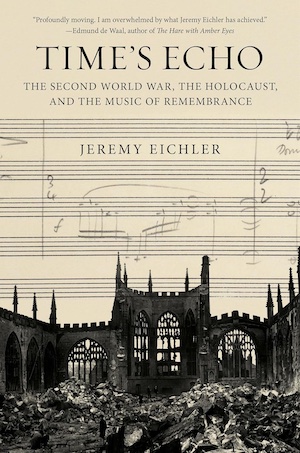By Indira Ganesan
Winner of ΦBK’s 2024 Ralph Waldo Emerson Award
Early in this moving, profound, and intelligently disturbing book, Jeremy Eichler sets out its subject: “The role of music . . . as a witness to history and as carrier of memory for a post-Holocaust world.” In Time’s Echo, he examines the lives and work of four composers—Richard Strauss, Arnold Schoenberg, Dmitri Shostakovich, and Benjamin Britten—focusing on how each dealt with the Second World War, that “global catastrophe,” which Eichler reminds us created “a tear in the fabric of humanity, resulting in deep trauma, grief, and scarring.” Music works with memory itself, taking the place of monuments and memorials, so that the listener not only goes back to hear what was, but what exists in the space to the present. “Music,” says Eichler, “remembers us.”
It remembers who we are as a civilization in the Second World War, a time when not only did nations fight over territory and power, “but entailed the branding of specific groups of human beings as categorically less than human, followed by their systematic extermination—not as a means to an end, but as an end in itself.” Schoenberg would respond to the Holocaust with “dissonance,” a form of music that “unsettles the emotions, unfreezing history, and keeping the losses of the past available to the present.”
Richard Strauss refused to disassociate himself from the Nazi regime, alienating his friends and admirers. Only in 1945 came Metamophosen, enigmatically called a memorial, although it does not specify to what or whom. Schoenberg’s response to the Germany he had once considered his homeland was to dive more strongly into Judaism and Zionism. Shostakovich had to contend with increasingly hostile Soviet governmental control of his work. Benjamin Britten, in England, had become a conscientious objector, yet toured with Yehudi Menuhin to the displaced persons camps set up after the war throughout Germany. Menuhin said that music acted upon the ravaged audiences as “the first food, the first friend, the first kind presence, the first water to a scorched human being.” For Shostakovich, music “was a hidden language of resistance.”
It would be Shostakovich who set Yevgeny Yevtushenko’s poem on Babyn Yar—which begins, “Over Babi Yar, there is no monument,” and documents not only the horrific murder of 33,000 Jews by gunfire by Nazi soldiers at a ravine that Stalin refused to acknowledge as a genocide of a specific people—as the opening movement to his Thirteenth Symphony. Eichler explains that “by holding a mirror to Soviet history not as myth but lived experience, the Thirteenth became more than a vehicle of conscience and more than a memorial. It became, in short, a threat.” Again and again, I was reminded of not only the atrocities committed in the Holocaust but of the Allied effort to shrink the idea of an extermination of a specific people to a more vague “war against innocents,” which would provide better news and sympathy. But music remembers. The Thirteenth serves, Eichler explains, as not only “a commemoration of the victims but also an indictment of the society that conspired to forget them.” Forgetting the extermination is a part of the extermination itself, wrote Jean Baudrillard, an insight that Shostakovich underscores.
In a prescient aside, Eichler notes, “In 2022, at the time of this writing, Putin has launched a new war of aggression, invading Ukraine in order to ‘denazify’ the country, as if the year were 1943 and the Second World War were still raging. The invasion of course only underscores the immensity of the consequences that false historical narratives can exact on the present, and its human costs have already been unspeakably tragic.”
He goes on to point out that Russian missiles struck the sites of a TV tower adjacent to Babyn Yar, as well as a building slated to be used as a future Holocaust memorial museum. Eichler reminds us of Faulkner, who wrote, “The past is never dead. It’s not even past.”
What a smart book and how chilling are the times we live in.
Time’s Echo is a needful and difficult read because it reminds us of both humanity and depravity, how each can exist side by side. Because I did not know the work of these composers, I found myself listening to the music, at once grateful that the music is readily available to be heard. We live in challenging times. The number of survivors of concentration camps grows smaller with each passing year, and with this reduction, we are in danger of forgetting. We have world leaders who still want to censor what we can read and write, and regulate who among us can have a voice. Eichler quotes critic Andreas Huyssen, who wrote, “The future will not judge us for forgetting, but for remembering all too well and still not acting in accordance with those memories.” Eichler concludes that musical memorials “request we listen to the past through music’s ears, that we recall particular moments in a linked history of catastrophe, and that this memory then inform our choices of the values we wish to perpetuate into the future.” Time’s Echo is a wise book, a necessity in the time we live now, where we are in danger of obliterating the past and our humanity in a tyrannical bid for power by repressive governments. We cannot afford to forget our crimes, so we do not repeat them.
Novelist Indira Ganesan was inducted into Phi Beta Kappa at Vassar College. Her books include The Journey (Alfred A. Knopf, 1990), Inheritance (Alfred A. Knopf, 1998), and As Sweet As Honey (Alfred A. Knopf, 2013).




